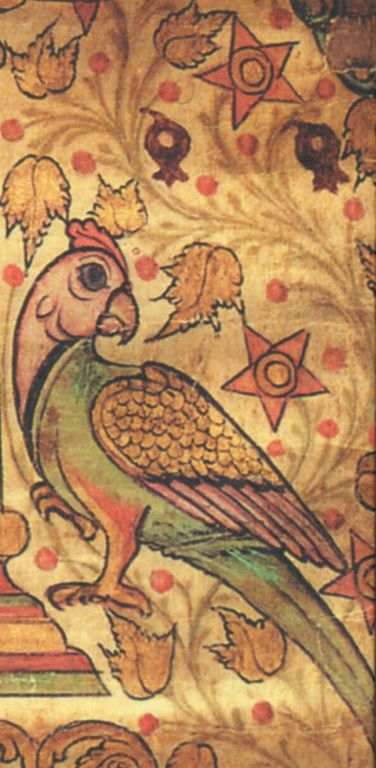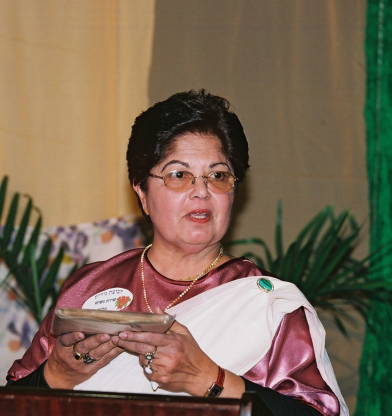1977
58. Ahashverosh Song
The introduction to songs 54-55 is available here.
Sarah Cohen, Rachel Hallegua, Ruby S. Hallegua, Seema Salem, Balfour Salem. Recorded by Barbara Johnson, Kochi, January 22, 1977; III-11.
Āti mŏtalāya aṟiñña aṟivāḷan
Āśuvěṟoś tanda nāḷila kāriyaṃ
1. From the start, all this was known by the Wise All-knowing One.
Ahashverosh was ruling then, while all this was going on.
These two went away to fight, in another far country—
Omon the Curséd one, and the Righteous Mordecai.
Omon wasted all he had, throwing all his wealth away,
And when all of it was gone, who was left to ask for more?
Not one person would give more to Omon, the Curséd one.
So he asked from Mordecai, from the Learnéd Mordecai.2. “If you sign a slavery bond, then the money I will give.”
So the bond was written out, and the money was received.
With anger kept inside his mind, Curséd Omon went to speak
To the King Ahashverosh. Curséd Omon said to him:
“A certain People you must kill; those you must humiliate.
If you do this, I will pay—ten thousand silver talent coins!”
Ahashverosh agreed to this; he agreed to Omon’s plea.
He put it down in writing then. Omon announced the vile decree.
Oroṟŏ nāṭṭil, ola kŏḍuttūtě
Ŏru nāṭṭilě ola, ŏru nāṭṭil āyītě3. Letters were sent on palm leaves—sent to every land.[1]
Letters intended for some lands went to a different land.
Curséd Omon was outwitted, and he turned very pale.
In sleep there came a dream then to Righteous Mordecai.
Shaken, he suddenly woke up—suddenly sat up in pain.
Wrapped in a woolen blanket, he smeared himself with ash.
And on the earth he fell down, lying there in tears.
Then who appeared in the garden? Eliyahu Hanabi!4. Mordecai then rose to greet him. He greeted him: “Shalom!
What’s new up in heaven?” Those were the words he said.
“Where did you put the judgment?[2] Where is the judgment put?
“The judgment is put on mud—it’s put on waxy mud.”
At once he called to Queen Esther—calling the queen to come.
Esther the queen came painfully—in distress she came.
“Tell me what is the reason? Why have you sent for me?”
“For no particular reason have I sent for you . . . but . . .5. Your People will be slaughtered! The order has been sent!”
“And why are you telling me? What can I do about that?”'
“In haste you must go to the King! Hurry now and go!”
“But tell me, how can I go, if it is not my turn?”
Her answer was not accepted, not by Mordecai.
In protest many people—women and children too—
Lay flat on the ground in prayer and fasted for three days.
Queen Esther arranged her hair then, in a most suitable style.
Pŏnnu muḍivěccu, pokunna rajadevi
Oḍuttayil ninnaṅṅŏlakunna nerattu—ŏlākunna nerattu6. Wearing a golden crown, there went the royal queen.
In the garden she went walking, walking up and down.
Ahashverosh then saw her. He caught her in his sight.
Waving his scepter, he called out; he called out to the queen.
“You have come, melting in beauty. O Esther, you have come!
Who was the one who sent you? Who told you to come?”
“No one told me or sent me; just like that I have come.
For Omon and his children, a feast must be prepared.”7. “All right Esther, you do it; do whatever you wish.”
At once she went to do it, preparing for the feast.
Once the feast was ready, she asked Omon to come.
Omon and his children came to the feast to dine.
“Omon and all the children who dined here today
Should come to dine tomorrow, come again to dine.”
Zeresh[3] began to worry, began to wonder then:
“There must be some reason for this feast today!”
And then on the next day they went again to dine.
While all of that feasting was still going on. . . .
Hah! omona kaṭṭummel, hah! oppicciruttītě
Hah! omona kaṭṭummel, hah! omon kiḍannūtě8. Hah! On the beautiful bed—Hah!—he was properly seated.
Hah! On the beautiful bed—Hah!—Omon lay down.
Hah! A mark was made to prove it— Hah!—by Esther the Queen.
Hah! “At one time he ordered— Hah!—that Vashti be killed.
Hah! Has he now ordered—Hah!—that I too should be killed?”
Hah! “Power should be given—Hah!—given into her hands.”
Hah! So the power was given—Hah!—to Esther the Queen.
Hah! The mortgaged houses—Hah!—taken by Omon on loan,
Hah! Every one of the houses—Hah!—went to Mordecai.
Hah! Omon took them by cheating. Hah! He forgot the One God.
Hah! You can see the tree there—Hah!—made by Omon himself.
Hah! To the tree Omon was taken. Hah! He was taken and hanged.
Through a mix of narration and dramatic scenes, this song conveys key events in the biblical book of Esther, chapters 4–8. It also incorporates elements from midrash. The story told in stanzas 1 and 2 is one example, expounded by Ginzberg (1968, 4:397–399, 6:464). He refers to Targum Esther and Aggadat Esther to explain that Haman’s hatred arose because he had once sold himself as a slave to Mordecai. Ginzberg (1968, 6:468) also cites Targum Esther 4:1 for the story that the prophet Elijah was sent from heaven as a messenger to warn Mordecai of danger.
Recorded in Kochi in 1977 during an informal Paradesi gathering, this very popular Malayalam song appears in twenty women’s notebooks, representing all six communities in which notebooks have been found. Its translation is divided into four parts according to four contrasting melodies.
Stanzas 1 and 2 are sung to the Kerala melody for “Mi Khamokha ve’En Kamokha,” a lengthy Hebrew piyyut recounting the Purim story. Composed by the medieval Andalusian poet Yehudah Halevy, it is sung on the sabbath before Purim (Shabbat Zakhor). Stanzas 3–5 are sung to an unidentified tune with a chanting quality, perhaps borrowed from a Chavittunatakam drama. This facilitates the ongoing narrative, as does the incorporation of colloquial dialogue in exchanges between Mordecai and the prophet Elijah (“Shalom! What’s new up in heaven?”), and between Mordecai and Esther (“Why are you telling me?”).
This conversational tone continues in stanzas 6 and 7, as Esther talks with the King and as Haman’s wife Zeresh worries aloud about the possible reason for the second feast. This section is sung to the Kerala tune for “Purim, Purim, Purim Lanu” (‘Areshet 1980, 271–272). The lines and half-lines of this third section are repeated in the same pattern as those in the Hebrew song.
Stanza 8, the final section, is sung to a rousing melody with rhythmic punctuation, very likely borrowed or adapted from Chavittunatakam. The explosive exclamation “Hah!” introducing each development in the plot emphasizes the bawdy and triumphal aspects of the song’s conclusion, and suits well the rhythmic demands of a “foot stamping” performance. My 1977 recording of this song and song 59 inspired the lively conversation in which the Jewish singers told me about these dramas and how they used to be performed by the Christian troupes visiting in Jewtown.
_____________________________
[1] In old Kerala, a letter would be written on an ola—a dried palm leaf, the traditional material for writing in South India. The ola would be cut in a long oblong shape, on which letters were etched with a metal stylus.
[2] Cencela. Ruby Daniel offered a possible translation of this word (unknown in Malayalam or Hebrew) as “judgment” and explained that what is sealed in wax rather than blood can be changed (Daniel and Johnson 1996, 93. Also Ginzberg 1968, 4:416).
[3] Zeresh was Haman’s wife.






